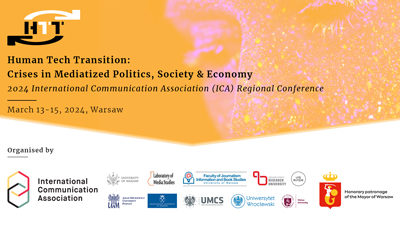 Last week, Warsaw became the hub of scientific debate on the coexistence of humans with technology in the context of contemporary global crises. The University of Warsaw hosted the international scientific conference "Human Tech Transition: Crises in Mediatized Politics, Society & Economy," which was attended by over 130 researchers from nearly 30 countries worldwide. Among the discussed topics were the growing importance of artificial intelligence, misinformation during wartime, and communication regarding the climate crisis. The conference was organized as part of Action II.3.4 (Gamification of Worlds in the Service of the Modern Society of the 21st Century) of the Excellence Initiative - Research University, led by the team of the Laboratory of Media Studies UW under the direction of Prof. UW Tomasz Gackowski with the support of the Faculty of Journalism, Information, and Book Studies UW.
Last week, Warsaw became the hub of scientific debate on the coexistence of humans with technology in the context of contemporary global crises. The University of Warsaw hosted the international scientific conference "Human Tech Transition: Crises in Mediatized Politics, Society & Economy," which was attended by over 130 researchers from nearly 30 countries worldwide. Among the discussed topics were the growing importance of artificial intelligence, misinformation during wartime, and communication regarding the climate crisis. The conference was organized as part of Action II.3.4 (Gamification of Worlds in the Service of the Modern Society of the 21st Century) of the Excellence Initiative - Research University, led by the team of the Laboratory of Media Studies UW under the direction of Prof. UW Tomasz Gackowski with the support of the Faculty of Journalism, Information, and Book Studies UW.
The conference took place at the University of Warsaw on March 14-15, 2024, and was co-organized by the Jagiellonian University, Adam Mickiewicz University in Poznań, Maria Curie-Skłodowska University in Lublin, Wrocław University, and Vilnius University. Earlier, as part of the pre-conference, on March 13, workshops for scientists were organized at the Museum of the History of Polish Jews POLIN. The first workshop, led by Marcin Łączyński and Adam Balcerzak, focused on generative artificial intelligence, while the second one, presented by Dr. Jan Wieczorek, discussed the CLARIN infrastructure. This was the first initiative of its kind where important regional universities joined forces with scientists from other international academic centers to engage in a debate on the significance of media technologies in political, social, and economic life, especially in the context of contemporary crises. The conference was held under the patronage of the world's most important scholarly society dealing with media and communication, the International Communication Association (ICA). The event also received honorary patronage from the Mayor of Warsaw, Rafał Trzaskowski.
The conference was opened by Prof. Alojzy Nowak, the Rector of the University of Warsaw; Tomasz Bratek, the Vice President of the City of Warsaw; and Prof. UJ Agnieszka Hess, the Vice President of the Polish Society of Social Communication.
During dozens of discussion panels, the following topics were addressed:
- Communication in times of war - new media, old strategies
- Manipulation using artificial intelligence
- Disinformation, polarization, and populism in the context of health communication
- Media and the discourse of climate change
- Disinformation in social media
- Digital public sphere in the context of algorithmization and datafication
In addition to the discussion panels, conference participants also listened to plenary lectures delivered by world-renowned researchers. "Among others, we heard a presentation by Prof. Silvio Waisbord (George Washington University, USA; President elect of the International Communication Association), who addressed the impact of vast information supply on contemporary democracies, while Prof. Aleksandra Przegalińska (Kozminski University in Warsaw) discussed the role of artificial intelligence in business and education in the near future," explained Anna Mierzecka (Laboratory of Media Studies UW), the coordinator of the Organizing Committee of the conference. "The issues raised by our keynote speakers, as well as other conference participants, are interdisciplinary and require a multi-perspective approach. Therefore, I am pleased that we managed to gather such a diverse group of experts for this extraordinary scientific debate," added Anna Mierzecka.
"The Human Tech Transition conference is not only a scientific event but also an inspiring journey through the labyrinth of contemporary media and technology. The extremely rapid development of new media, including immersive ones, in which we immerse ourselves with many senses, poses immense scientific and social challenges. We discussed them to seek a recipe for managing the relationship between humans and technology in times of imminent crises, so that the balance of gains and losses always favors the user. We are very satisfied because the participants spoke very positively about the conference, emphasizing its high level of content and successful organization," emphasized Dr. Karolina Brylska (Laboratory of Media Studies UW), the coordinator and one of the initiators of the event.
The detailed program of the event is available here, and more details can be found on the conference website: www.htt.events.
Photos by: Paweł Brzeziński